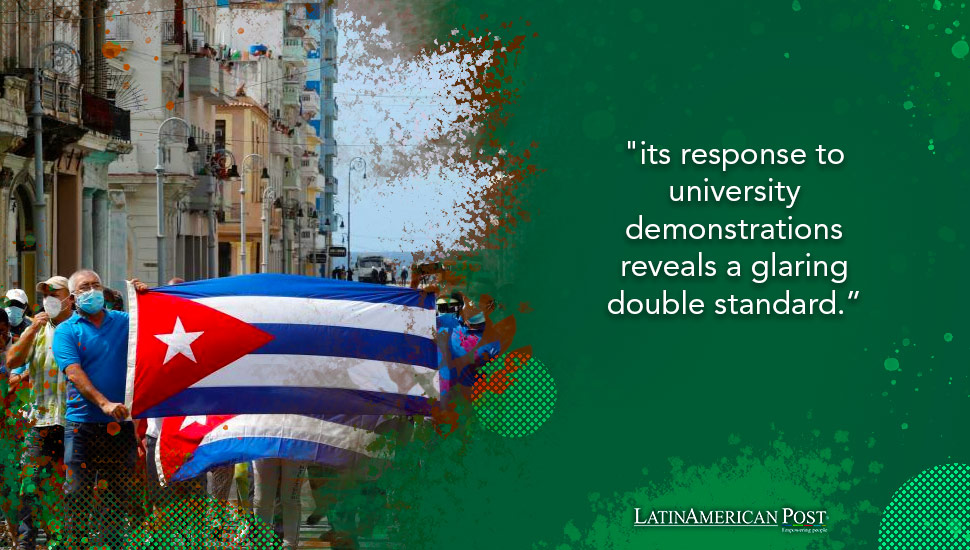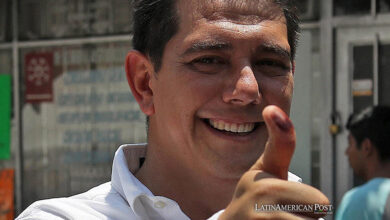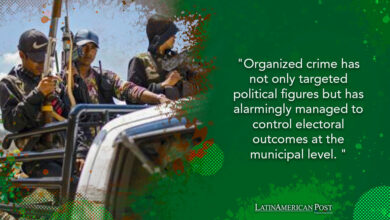U.S. Condemns Cuba’s Protest Sentences Amid Own Crackdowns

As the U.S. government criticizes Cuba for harshly sentencing protesters, its response to university demonstrations reveals a glaring double standard, undermining its position on global human rights issues.
The recent decision by a Cuban court to impose severe prison sentences on protesters has drawn sharp criticism from the U.S. government. Brian Nichols, the U.S. Assistant Secretary for Western Hemisphere Affairs, labeled the punishments — which range up to 15 years for acts including sedition and sabotage during power cut protests — as “outrageous.” This condemnation, however, highlights a glaring hypocrisy in the United States’ stance, particularly as it grapples with its internal dissent and the suppression of protests across various U.S. universities.
Economic Hardship and Government Response
In Cuba, the context of these protests is dire economic straits compounded by U.S. sanctions, leading to acute shortages in essentials like food, fuel, and medicine and exacerbated by lengthy power cuts. The protests in August 2022 in the town of Nuevitas were a desperate outcry against these deteriorating conditions. Yet, the Cuban government’s response was to heavily penalize its citizens for their dissent, an act that fits a long-standing pattern of repression on the island, where public gatherings are stringently controlled.
The U.S. has been quick to decry these actions, positioning itself as a champion of civil liberties. However, this stance seems disingenuous when mirrored against its treatment of protesters. Across numerous U.S. universities, there have been multiple reports of administrative and even police actions taken against students and faculty who protest various issues ranging from racial injustice to administrative policies. The suppression methods have been criticized for being overly harsh and, at times, undermining the very essence of academic freedom and the right to peaceful protest.
This duality presents a troubling picture. On the one hand, the U.S. advocates for freedom of speech and assembly internationally, often using such issues as leverage in diplomatic negotiations and to exert moral pressure. On the other hand, it falters in upholding these ideals within its borders, particularly in educational institutions that are supposed to be bastions of free expression and thought.
Selective Critique and Sanctions: A Complex Scenario
The irony is further deepened by considering the broader Latin American context, where U.S. foreign policy has historically involved a mix of interventionism and advocacy for democratic norms. While the U.S. has often been quick to call out human rights abuses in countries like Venezuela, Nicaragua, and Cuba, it has been less vocal or straightforward about abuses in allied countries or within its territories.
For instance, during the July 2021 protests in Cuba — the largest in decades — the U.S. was vociferous in its support for the Cuban people’s right to protest. Yet, similar large-scale demonstrations in the U.S., such as those during the 2020 Black Lives Matter movement, saw significant instances of law enforcement crackdown, with numerous reports of excessive force. This discrepancy suggests a selective approach to civil liberties contingent on political convenience rather than principled consistency.
Moreover, the U.S. critique of Cuba’s handling of protests must be seen within the complex web of economic sanctions imposed by the U.S., which have undeniably exacerbated Cuba’s financial crises. These sanctions are often justified under the guise of promoting democratic reforms but have also significantly hindered the Cuban government’s ability to meet the basic needs of its people, arguably fueling the very protests that it then suppresses.
As such, the U.S. finds itself in a precarious position. Though potentially valid, its criticisms of Cuba are undermined by its own actions both historically and presently. For the U.S. to truly lead by example, it must foster an environment that respects and upholds the right to peaceful protest and free speech universally—not just when it serves its geopolitical interests.
Also read: Cuba’s Aging Crisis: Private Caregivers Fill the Gap
In essence, the situation calls for a profound reflection on the part of U.S. policymakers. The commitment to human rights and democratic freedoms must be unwavering and universally applied. Only then can the U.S. legitimately challenge other nations on their civil liberties records without facing charges of hypocrisy. Until such parity is achieved, its criticisms of countries like Cuba risk being seen as nothing more than a tool of foreign policy rather than genuine concern for the fundamental rights of people.





